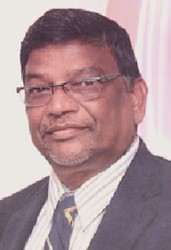Labour Minister Dr. Nanda K Gopaul yesterday stated that Dr. Walter Rodney never gave any impression that he was planning a “violent overthrow” of the then PNC government.
Dr. Gopaul made this pronouncement at the close of the sixth session of the Commission of Inquiry into the death of Rodney.
Testifying at the Supreme Court Law Library, he said Rodney never showed any signs that he was planning violence in the country. He also stated that he was not aware of any surveillance carried out by the Working People’s Alliance (WPA) to monitor President Forbes Burnham’s movements.

He was crossed-examined yesterday by PNCR attorney Basil Williams, who questioned him if he believed that the WPA was planning a coup after it had stated that “the government had to go” by a particular date.
Gopaul, who was on the stand for a third day in a row, said that he did not believe that the WPA was sending a threat through that statement but instead it was stating its position on democracy. He posited that it might have been looking to have conversations with the government about democracy instead of planning an overthrow.
He noted that he was not aware of any alliance between the WPA and the People’s Progressive Party (PPP) to overthrow the government.
“Nothing Rodney said gave any impression that they were planning to overthrow the government or planning violence in the country,” he said, before adding that all they wanted was to restore democracy.
However, the government at that time, he said, was responding ruthlessly to people’s agitation and calls and continued to oppress.
“We have seen the nature of a dictator,” he said, talking about the atmosphere after the PNC headquarters was burnt down and WPA members, including Rodney, were charged. He said the government’s response was that of a dictatorship.
However, he said throughout their struggles there were no calls for violence or illegal actions. “I do not support violence,” he said.
He noted that public servants were coerced into supporting PNC meetings by attending and Guyanese were denied freedom of travel. He said the lack of freedom of travel occurred because of a shortage of foreign exchange. He stated that foreign currency had to have been released by the government and so many persons did not have access to that and would have difficulty purchasing tickets.
“Can you call that freedom of travel?” he asked Williams, who stated that his account was inaccurate.
No collective bargaining
Williams suggested to him that, even though he stated that there was no collective bargaining during that time, there is at present no collective bargaining. Williams stated that there has been not collective bargaining since 2001, while questioning whether the present government was “collectively bargaining” with public servants now.
Gopaul argued with him that his question had nothing to do with Rodney’s killing or the time leading up to it.
He stated that he would not answer questions by Williams that had nothing to do with the time surrounding Rodney’s death.
“You have to answer my questions!” Williams argued.
Gopaul stated that he was not ordered to testify in the commission by anyone or any organisation and instead he came forward as “…a trade unionist who is aggrieved that Walter Rodney was killed in this manner.”
“I want to bring closure to this commission and I want people to understand,” he said, adding that he has never tried to impose a political position on anyone or dismiss any workers without cause. He said he has never discriminated against any worker and he continues to negotiate on their behalf.
During his testimony, Gopaul had stated that the Burnham regime had heavily oppressed workers and had dismissed 82 workers on one occasion. He had stated that the government had used laws to oppress the people and drive fear into them. He stated that the population cringed in the fear of victimisation for speaking against the government.
He also stated that workers were denied the right to bargain collectively because by that time there was enforced centralised bargaining. He said an agreement was entered between the government and the Guyana Trades Union Congress and a minimum wage of $14, which should have been implemented in 1979, was not.




